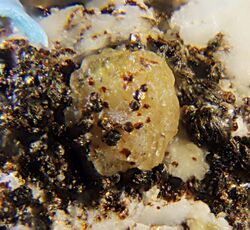Chemistry:Mckelveyite-(Y)
| Mckelveyite-(Y) | |
|---|---|
 Mckelveyite-(Y) found in Canada | |
| General | |
| Category | Carbonate mineral |
| Formula (repeating unit) | Ba3Na(Ca,U)Y(CO3)6·3H2O |
| Strunz classification | 5.CC.05 |
| Crystal system | Triclinic |
| Crystal class | Pedial (1) (same H-M symbol) |
| Space group | P1 |
| Unit cell | a = 9.170(3) Å, b = 9.169(3) Å, c = 7.075(2) Å; α = 102.50(3)°, β = 115.63(3)°, γ = 59.99(3)°; Z = 1 |
| Identification | |
| Color | Lime-yellow, greenish gray, reddish brown, may be black from contained organic material |
| Crystal habit | Tabular, pyramidal |
| Twinning | Threefold (pseudorhombohedral about {0001}) |
| Cleavage | Indistinct |
| Mohs scale hardness | 3.5–4 |
| |re|er}} | Vitreous, greasy, or dull |
| Streak | White |
| Diaphaneity | Transparent to opaque |
| Specific gravity | 3.25 |
| Optical properties | Biaxial (−) |
| Refractive index | nα = 1.550–1.554 nβ = 1.550–1.554 nγ = 1.649–1.658 |
| Birefringence | δ 0.0990–0.1040 |
| Pleochroism | Visible |
| Other characteristics | |
| References | [1][2][3] |
Mckelveyite-(Y) is a hydrated sodium, barium, yttrium, and uranium–containing carbonate mineral, with the chemical formula Ba3Na(Ca,U)Y(CO3)6·3H2O.[1][2]
Occurrence
It was first described in 1965 from deposits in the Green River Formation, Sweetwater County, Wyoming, and is named after Vincent Ellis McKelvey (1916–1985), a former director of the United States Geological Survey.[5]
It occurs associate with trona layers in the Green River Formation of Wyoming and has been reported from an alkalic intrusive, the Khibiny Massif in the Kola Peninsula of Russia. It occurs in association with ewaldite, acmite, biotite, quartz, labuntsovite, searlesite and leucosphenite in the Green River Formation. In the Khibiny Massif it occurs with ewaldite, belovite-(Ce), fluorite, nenadkevichite, ancylite-(Ce), synchysite-(Ce), kukharenkoite-(Y), burbankite, calcite, barite and orthoclase. In the Khanneshin complex, Afghanistan it occurs with dolomite, calkinsite-(Ce), carbocernaite, khanneshite and barite.[1] It has also been reported from the Mont Saint-Hilaire intrusive complex in Quebec.
A related neodymium-rich mineral, mckelveyite-(Nd) has been described for an occurrence in the Vuoriyarvi alkaline-ultrabasic massif on the Kola Peninsula. However, the mineral has not been approved by the IMA.[6]
See also
References
- ↑ 1.0 1.1 1.2 Anthony, John W.; Richard A. Bideaux; Kenneth W. Bladh; Monte C. Nichols (1995). Handbook of Mineralogy. Tucson, Arizona: Mineral Data Publishing. ISBN 978-0-9622097-1-0. http://www.handbookofmineralogy.org/pdfs/mckelveyitey.pdf.
- ↑ 2.0 2.1 "Mckelveyite-(Y)". webmineral.com. http://webmineral.com/data/Mckelveyite-(Y).shtml. Retrieved 2008-12-13.
- ↑ Mckelveyite-(Y) on Mindat.org
- ↑ Warr, L.N. (2021). "IMA–CNMNC approved mineral symbols". Mineralogical Magazine 85 (3): 291–320. doi:10.1180/mgm.2021.43. Bibcode: 2021MinM...85..291W.
- ↑ Milton, C.; B. Ingram; J.R. Clark; E.J. Dwornik (1965). "Mckelveyite, a new hydrous sodium barium rare-earth uranium carbonate mineral from the Green River Formation, Wyoming.". Am. Mineral. 50: 593–612. http://www.minsocam.org/ammin/AM50/AM50_593.pdf.
- ↑ Mindat
 |

